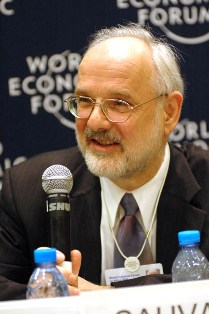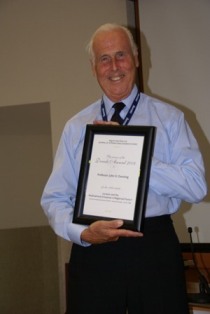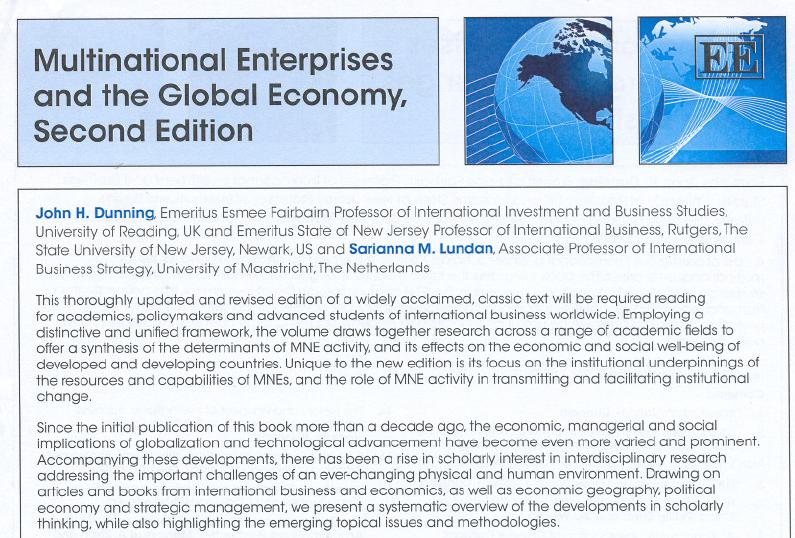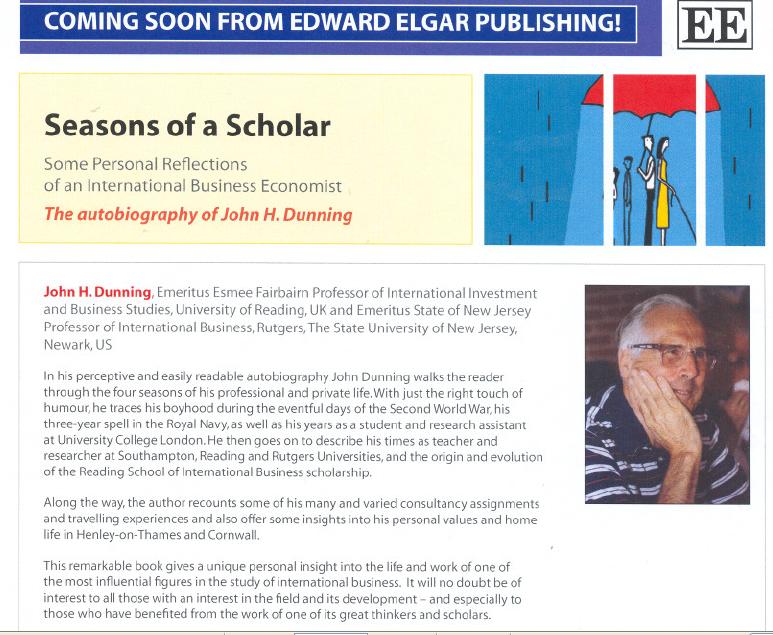| Dr Karl Sauvant: A New Career for the Second Distinguished Honorary EIBA Fellow |
Danny Van Den Bulcke
EIBA Chairman
Until July 2005, Dr Karl P. Sauvant was director of UNCTAD’s Division on Investment, Technology and Enterprise Development (DITE), the focal point in the UN system for matters related to FDI and technology as well as the major interface with the private sector.
 In 1991, Karl Sauvant started the well known annual World Investment Reports (WIR), which is continued until today and brings IB scholars up to date on the worldwide and regional trends and policies with regard to FDI, together with a more detailed analysis of a particular theme. The last of the 15 reports Karl was responsible for was WIR-2005, which dealt with ‘Transnational Corporations and the Internationalization of R&D’. In 1992 he launched the journal ‘Transnational Corporations’ another outlet for academic and policy oriented studies about the strategies of transnational corporations and the policy issues governments and international organizations are confronted with. Together with John Dunning he edited the 20 volume Library on Transnational Corporations (published by Routledge). While managing DITE he contributed to a large number of initiatives that promoted international consensus building in the areas of FDI and the activities of TNCs. In 1991, Karl Sauvant started the well known annual World Investment Reports (WIR), which is continued until today and brings IB scholars up to date on the worldwide and regional trends and policies with regard to FDI, together with a more detailed analysis of a particular theme. The last of the 15 reports Karl was responsible for was WIR-2005, which dealt with ‘Transnational Corporations and the Internationalization of R&D’. In 1992 he launched the journal ‘Transnational Corporations’ another outlet for academic and policy oriented studies about the strategies of transnational corporations and the policy issues governments and international organizations are confronted with. Together with John Dunning he edited the 20 volume Library on Transnational Corporations (published by Routledge). While managing DITE he contributed to a large number of initiatives that promoted international consensus building in the areas of FDI and the activities of TNCs.
Apart from his work in the United Nations Dr Karl Sauvant has published widely on issues related to economic development, FDI in services and international investment agreements.
Since his retirement from the UN in 2006, Karl Sauvant became Executive Director of the Columbia program on International Investment, and lecturer in Law at Columbia Law School and Special Advisor to the UN Millennium Project of Columbia University.
Back in New York after many years, Karl Sauvant has organized several conferences at Columbia University on TNCs. The papers of the first one of the conferences on TNCs have been published in a book he edited.
Starting with 2008-2009 three fellowships are granted to candidates who intend to focus on FDI while studying at the Columbia Law School. The fellowships are in the form of partial tuition waivers for one academic year. There also are the so-called Appel Fellowship and the Appel Research Scholarship on the Regulation of Multinational Enterprise for a student who intends to concentrate the research at Columbia Law School on regulatory or policy issues emerging from the trans-boundary operations of transnational corporations.
His edited volume ‘The Rise of Transnational Corporations from Emerging Markets. Threat of Opportunity?’ was published by Edward Elgar at the beginning of 2008, and is the first in a new series on ‘Studies in International Investment.’ It is composed of 17 chapters divided in 5 Parts. Part 1 consists of two overview chapters by Karl Sauvant and Jeffrey Sachs. Part 2 explores the growth and pattern of outward FDI from developing countries and has among its best known authors, John Cantwell, Alan Rugman, Peter Buckley and John Dunning. Part 3 tries to anwer the question what is in it for host countries, with chapters by Andrea Goldstein, Rainer Gaiger and Carrie Hall. Part 4 poses the same question as to what is in it for home countries and international organizations, with contributions from Steve Globerman, Theodore Moran, Edward Graham, and Joseph Stiglitz. In the final part Lorraine Eden and Zenaida Hernandez draw some conclusions. As this volume bundled the papers of a first conference, and Karl Sauvant has since then organized two more conferences about related topics since then, more edited volumes can be expected to come out of the recently renamed: Vale Columbia Center on Sustainable International Investment.
|
| Top |
| John H. Dunning: EIBA's Lifetime Achievement Award - Follow up |
Danny Van Den Bulcke
EIBA Chairman
In 2004 during the annual EIBA Conference in Ljubljana, the EIBA Fellows and the whole EIBA community decided to award John Dunning, Emeritus Professor of the Universities of Reading and Rutgers, its first and only Lifetime Achievement Award in International Business.
 Following this decision, EIBA-zine devoted two articles to John Dunning’s career. In fact the first two parts were an abbreviated and slightly adapted version of his own description of the different stages in his career, as originally published in the Journal of International Business Studies JIBS), 20024, No 4, entitled ‘Perspectives on International Business Research: A professional Biography. Fifty Years of Researching and Teaching International Business’. The first part published in EIBA-zine covered the decennia from the 1950s to the 1970s and appeared in the 2006 October issue, while the 1980s and 1990s were dealt with in the second part (EIBA-zine October 2007). In the introduction to the latter issue I wrote ‘It is hoped that he will accept to write out his experiences during the first decennium of the new millennium and update the conclusions of his JIBS article as a third part of the next issue of EIBA-zine’. Following this decision, EIBA-zine devoted two articles to John Dunning’s career. In fact the first two parts were an abbreviated and slightly adapted version of his own description of the different stages in his career, as originally published in the Journal of International Business Studies JIBS), 20024, No 4, entitled ‘Perspectives on International Business Research: A professional Biography. Fifty Years of Researching and Teaching International Business’. The first part published in EIBA-zine covered the decennia from the 1950s to the 1970s and appeared in the 2006 October issue, while the 1980s and 1990s were dealt with in the second part (EIBA-zine October 2007). In the introduction to the latter issue I wrote ‘It is hoped that he will accept to write out his experiences during the first decennium of the new millennium and update the conclusions of his JIBS article as a third part of the next issue of EIBA-zine’.
Even though he is coping with illness since the beginning of 2008, John Dunning has done much better than expected, as he has written a full fledged biography with the title: ‘Seasons of a Scholar. Some Personal Reflections of an International Business Economist. The Autobiography of John Dunning’. It will be available at the EIBA Conference in Tallinn in a hardback and paperback version (published by Edward Elgar, 192 pages, respectively £ 49.95 and £ 20).
The year 2007, was a hectic year for John Dunning. Wherever he went during that year –and he travelled on all the continents, except Antartica - he was being congratulated on his 80th birthday and had to engage in a lot of birthday cake cutting ceremonies.
The first major event took place at the University of Reading and was organized by Rajneesh Narula of the Centre for International Business and Strategy. The theme of the two-day April conference in Reading was ‘Four Decades of International Business at Reading: Looking to the Future’. During this workshop a scrapbook was presented to John Dunning with the title ‘A Global Celebration. Upon the occasion of John’s 80th birthday’. With warmest regards from his colleagues and friends’. Because his birthday coincided with the annual conference of the Academy of International Business (AIB) in Indianapolis, this meant that John had to deal with a continuous flow of congratulations during the whole conference. In July, in Henley on Thames, family and close friends gathered for another birthday party to which about a hundred guests were invited. Last year in Catania John was honoured again by a plenary panel session, chaired by Danny Van Den Bulcke, in which his first major paper about the eclectic theory (1977) (30 years later) was discussed by Farok Contractor, Alain Verbeke and Sarianna Lundan, together with the completely revised version of his ‘magnum opus’ ‘Multinational Enterprises and the Global Economy’ co-authored by Sarianna Lundan. The session was entitled ’The Eclectic Theory, the Multinational Enterprise , and the Global Economy. John Dunning’s Magnum Opus’ Regretfully, the printed version of the book was not yet available in Catania, in December. However, at the AIB Conference in June 2008 in Milan, John could sign the first copies of this basic treatise of foreign direct investment and multinational enterprises.

More honours have been bestowed on John Dunning during 2008, the year of the anniversary of the publication of his trendsetting 1958 book on ‘American Investment in the British Manufacturing Industry’. During the AIB conference in Milan in July, the EIBA Fellows organized a session about ‘The European Union at 50. FDI in the EU. Achievements, Challenges, and Corporate Responses’, which took the 1958 book as its starting point (see further in this Newsletter). The session, in which John himself could participate, was chaired by Danny Van Den Bulcke and also included Vitor Corado Simoès, Juan José Duran and Marjan Svetlicic. During the AIB conference he received the JIBS Decade Award for his article about ‘Location and the Multinational Enterprise. A Neglected Factor’ (1998). And that John Dunning’s work was not only appreciated by his fellow academics, was clearly shown when he was honoured with the ‘Order of the British Empire’ (OBE), which he received from the hands of Queen Elizabeth during an impressive ceremony a few weeks ago. Also on December 12 there will be a special ceremony at the University of Reading, where the Centre of International Business will be renamed as the John H. Dunning Centre for International Business.
I herewith include an extract of John Dunning’s autobiography which he forwarded to me in June of this year (pages 248-252 from an early manuscript) and which concentrates on the years 2002- 2007, thereby complementing the JIBS article referred to earlier and used for the parts 1 and 2 which appeared in the two previous EIBA-zines.
|
| Top |
| John H. Dunning: Fifty Years of Research and Teaching - Part 3 |
John H. Dunning
Emeritus Professor Universities of Reading and Rutgers
“Writings of such scholars as Bertil Ohlin, Stephen Hymer, Harry Johnson, Ray Vernon and Jack Behrman and in the 1970s and 1980 those of Charles Kindleberger, Dick Caves, Mira Wilkins and Peter Gray have certainly had a great impact on my own research. But, I have increasingly become more influenced in my thinking by the work of the younger generation of scholars, and more particularly by that of my colleagues of the Reading School, and latterly my ex-Ph.D. students at Rutgers University.
And it has been in the supervision of more than 50 Ph.D. students and research assistants at Southampton, Reading and Rutgers Universities, and the sharing of the subsequent scholarly success of many of them, together with collaborating with more than 60 colleagues –both senior and junior- in writing monographs and articles and chapters in books; and the friendship and interchange of ideas at many conferences that has given me the most satisfaction in my career.
Of course, I cannot deny that I have enjoyed a comfortable standard of living, travelling to 85 countries in all five continents, of meeting and exchanging views with illustruous political leaders and business executives, and of receiving various accolades, including five honorary doctorates. But, at the end of the day, my real fulfilment has come from any small contribution I have made to the development of international business as a unique field of study; and to the education of at least a few of the future leaders of our profession.
Between the publication of my JIBS contribution in 2002, and the end of 2007, I continued to be actively involved in scholarly research, and attended most IB related conferences. With the most valued help of Sarianna Lundan, a much revised and updated version of the Multinational Enterprise and the Global Economy was completed in 2007, and published by Edward Elgar in May 2008. Sarianna and I also pursued our joint interests in the (changing) role of corporate and national institutions in influencing the level and structure of IB activity in a globalising world economy. Between 2001 and 2007 I collaborated with Tagi Sagi-nejad in a project which aimed to assess the contribution of the UN and its various agencies in the understanding of the impact of MNE activity on economic development and international relations. I also continued my role as Senior Economic Advisor to UNCTAD; and took on a new consultancy assignment for UNIDO which at the time of writing is investigating the impact of inbound FDI on the indigeneous technological and managerial capacity of some 30 sub-Saharan countries.

I also continued a busy travel schedule throughout the first decade of the 2000s. Each year I spent some time at Rutgers University giving seminars and talking with Ph.D students; and every other year I visited Georgia Tech in Atlanta as external asessor on their CIBER programme. I also gave keynote addresses on a range of IB topics at several Asian and European universities. In 2004, I was privileged to receive the Distinguished Scholar Award from the International Management Division of the Academy of Management and a Lifetime Award for Scholarly Excellence in IB from the European International Business Academy (EIBA). Then in 2008 I was informed that the Centre of International Business at the University of Reading was to be renamed as the John H. Dunning Centre of International Business. Needless to say, I greatly appreciated these honours and two further honorary doctorates - one from the University of Lund, Sweden and the other from the Chinese Culture University in Taipe, Taiwan which were awarded in 2007.
All in all, the second half of my 70s was one of the most enjoyable and productive parts of my life. At the same time, during these years, my wife and I managed to spend up to three months each year enjoying the delights of the coastal scenery of Cornwall in South West England, where in 1999 we acquired a second home. As long as I am able I shall do everything in my power to promote international business as a rich mosaic of inter-related disciplines, and to give what assistance and encouragement I can to the next generation of scholars to recognise its uniqueness, to enlarge its scope and to upgrade its intellectual prestige.
Since the mid-1990s, the focus of my research has changed. While I have continued to work closely with UNCTAD, UNIDO, the World Investment Promotion Agency (WIPA) and the national investment promotion agencies of China and Korea, an increasing proportion of my scholarly attention is devoted to two topics viz (i) the moral imperatives of global capitalism, and corporate social responsibility and (ii) the role and content of micro and macro institutions in influencing both the determinants and effects of IB activity.
With regard to the second topic, under the stong influence of Douglas North and several IB scholars in the 1990s, Sarianna Lundan and I have summarized some of our views on the interface between institutions and MNEs in the 2008 edition of Multinational Enterprises and the Global Economy. Indeed, apart from updating the data, and extending the analysis and the empirical content contained in the first edition, I would regard our explicit incorporation of country (national) and firm (corporate) specific institutions into mainstream IB research as one of the most valuable scholarly responses to the emergence of the globalization of the world economy over the past 20 years. The essential point here is that globalization and its various attributes have led not only to a much closer economic independence between the wealth creating activities of firms and nations - but also that between widely differing cultural and belief systems. And it is this latter domain where it is much less easy, let alone desirable, to exploit the benefits of economic integration. Moreover, it is only by reconfiguring corporate and/or national institutions that the social and cultural consequences of such integration can be made more inclusive and creditable. In this connection, many IB and other writers have stressed the increasing importance of social capital as a critical competitive advantage of firms and countries in the global economy. And, it is at this juncture where my own interests in the moral imperatives of global capitalism and that of institutions intersect. I hope to continue working in the area of institutions, and the evolutionary theory of economic change, and of how each interacts on a whole variety of IB topics.
Towards the final season and second childhood
From time to time in my 60s and 70s I thought about about what I would like to do when my time came to retire from academic life. I did not anticipate continuing with my research or teaching much beyond the early 1990s, but rather do something to which I could apply my Christian beliefs. Much earlier in the 1950s and 1960s, I had enjoyed lay preaching, but I ruled this option out after the events of the subsequent decade.
Again, serendipity entered into the picture. In 1998 I was invited to give a talk on the Christian response to global capitalism at the annual meeting of the European International Business Academy (EIBA) in Jerusalem. This, along with the parallel presentations with Jewish and Islamic speakers, stimulated a great deal of interest among my friends and colleagues, and after careful thought, and with a growing realisation that moral and ethical issues were now increasingly entering the domain of globalization, I redirected much of my scholarly attention in the early 2000s towards identifying the ways and means by which capitalism could be made both more economically inclusive and socially acceptable.
One of the results of this work was the publication of my edited volume ‘Making Globalization Good’ – in 2003 by the University of Oxford Press. To finance the project, I secured generous grants from the Templeton and Carnegie Bosch Foundations. My aim was to gain the insights of distinguished scholars, businessmen and statesmen on (what they perceived to be) the essential moral and ethical attributes of a sustainable global market based system. In this, I believe, I was successful. I certainly learned a lot about the different views expressed, but, at the end of the day, I was comforted to discover that there was a substantial commonality among the contributors as to what they thought needed to be done if global capitalism was to be an efficient, fair and sustainable economic system for both the creation and utilisation of scarce human and physical resources.
The volume was launched at three half day conferences in London and New York in 2003, and New Delhi in early 2004. But, in spite of a sensitive introduction to the volume by the Prince of Wales, the press coverage was disappointing; and although subsequent reviews of the book have been favourable, they have not been as many as I would have wished. In short, the impact of my efforts has been much less than I had hoped for; and this in spite of the almost daily indicators of corruption, corporate malfaisance, and differences among belief systems on the content of the ‘good’ society. It would seem that moral issues do not rate high on the agenda for action of most people. In this respect, I compare the present attitudes to the ethical imperatives of capitalism to those towards climate change 20-30 years ago. And like the latter, I fear that, by the time it is recognized that there are endemic moral challenges to the contemporary global market system, which must be tackled, it will be too late!
I continue to address this issue in my writings and lecturing. For example, in 2000, I contributed a paper to the ‘Moral Response of Capitalism: Can we learn from the Victorians?’ to a symposium organized by Julian Birkinshaw and his colleagues at the London Business School in honour of John Stopford. I also observe that, almost every day, in the popular media, and in the gatherings ranging from the World Economic Forum to the United Nations, and in the interfaith dialogues, the issue of religion in business is aired.”
|
| Top |
|
 In 1991, Karl Sauvant started the well known annual World Investment Reports (WIR), which is continued until today and brings IB scholars up to date on the worldwide and regional trends and policies with regard to FDI, together with a more detailed analysis of a particular theme. The last of the 15 reports Karl was responsible for was WIR-2005, which dealt with ‘Transnational Corporations and the Internationalization of R&D’. In 1992 he launched the journal ‘Transnational Corporations’ another outlet for academic and policy oriented studies about the strategies of transnational corporations and the policy issues governments and international organizations are confronted with. Together with John Dunning he edited the 20 volume Library on Transnational Corporations (published by Routledge). While managing DITE he contributed to a large number of initiatives that promoted international consensus building in the areas of FDI and the activities of TNCs.
In 1991, Karl Sauvant started the well known annual World Investment Reports (WIR), which is continued until today and brings IB scholars up to date on the worldwide and regional trends and policies with regard to FDI, together with a more detailed analysis of a particular theme. The last of the 15 reports Karl was responsible for was WIR-2005, which dealt with ‘Transnational Corporations and the Internationalization of R&D’. In 1992 he launched the journal ‘Transnational Corporations’ another outlet for academic and policy oriented studies about the strategies of transnational corporations and the policy issues governments and international organizations are confronted with. Together with John Dunning he edited the 20 volume Library on Transnational Corporations (published by Routledge). While managing DITE he contributed to a large number of initiatives that promoted international consensus building in the areas of FDI and the activities of TNCs.